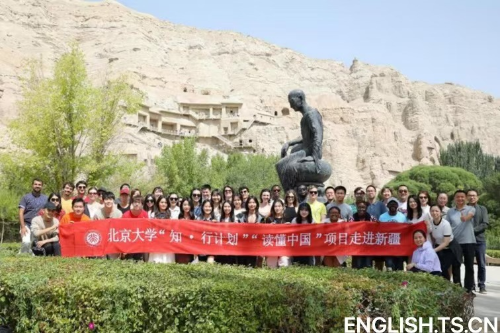When asked a question such as "Which word best describes Xinjiang?", the first reaction is confusion.
Xinjiang is big, beautiful, hot, cold, dry - the list goes on. Finding one single word is very difficult. My final choice? "Exemplary".

Enrico and his schoolmates attend an activity.
The first few glances at Xinjiang happened during the plane’s landing in Aksu Prefecture. It was already breath-taking, with red and steep mountains alternating with sandy lands and sporadic patches of green.
I was already amazed by what I saw so far. The next best thing was the first breath of air that tickled my nose, tasting fresh and soothing, enveloping me in a warm cloth of gentle wind while whispering in my ears the long-forgotten stories of the desert.
Xinjiang is so vast that whenever we wanted to travel, we had to either take a plane or spend many hours on the bus. I must admit that bus rides were rather enjoyable. The back seats had the possibility of opening the windows, which allowed me to truly capture the air of this land. The initial ride was long and straight,with a single road merging into the horizon when you looked ahead.
During this first trip, we were introduced to the diversity of Xinjiang. We encountered the flat yellow desert, the red and sharp mountains, and the randomly appearing green bushes. It resonated with a sense of wilderness in my ears, and my eyes confirmed it. It was truly a dryland where man does not set the rules, but must learn to adapt to nature’s will. It was indeed the ancient spirit of Xinjiang welcoming us, students and teachers from PKU.
Xinjiang serves not only as a crucial transportation hub but also a region with diverse cultures along the ancient Silk Road. I visited the Kizil Thousand-Buddha Caves, one of China's earliest large-scale grotto groups. The area was serene, surrounded by a dry forest of various short trees. The Caves not only served as an attraction but also provided shelter from the scorching sun outside.

Peking University students on a tour of the Kizil Thousand-Buddha Caves in Xinjiang.
The arrival in Kuqa City in Aksu Prefecture was astonishing. One moment before, it had been a desert as far as the eye could see, and the next moment, the eye witnessed lush cultivations, green and fertile land, and a bustling human presence that had been absent until then.
Kuqa is an enjoyable city with thousands of years of history. It is located very close to the Subash Buddhist temple ruins which offer insights into the ancient way of life. Additionally, there is a lively King Palace in Kuqa, now a major tourist attraction due to its museum showcasing historical artifacts.
But Kuqa offers much more.
Once the sun sets, the buildings light up, and the ferris wheel on the lake starts moving, projecting its colorful lights all over the water surface. People visit food markets to enjoy local delicacies, while others prefer to sit in quiet places. I was lucky enough to be invited by a group of locals to sit down and chat. They shared their stories, traditions and culture with me while offering delicious freshly cooked lamb chops. Gradually, through these added experiences, I felt that I was starting to understand Xinjiang.
Enrico is an Italian student studying at Guanghua School of Management in Peking University.
Planner : Jie Wenjin
Reviewers : Hou Weili and Cheng Li
Editor: Gvlzar Mijit









